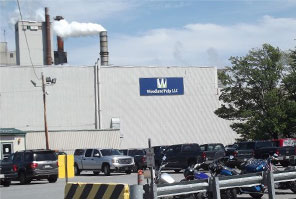News + Events
Mill to add 2 tissue machines, 80 jobs in Washington County

Last modified March 12, 2014, at 2:59 p.m.
AUGUSTA, Maine — Woodland Pulp will expand its pulp mill in Baileyville into paper manufacturing, an investment that will add 80 new jobs in one of Maine’s poorest counties, Gov. Paul LePage announced Wednesday.
The company will install two tissue machines at the plant, a capital investment of about $120 million, the governor announced at a morning news conference. The machines will be operated by St. Croix Tissue Inc., an affiliate of Woodland Pulp. Tissue will be made from pulp supplied by Woodland Pulp.
The new tissue machines each are expected to generate 60,000 tons of tissue a year, according to Doug Ray of the state Department of Economic and Community Development.
Maine has a history of tissue production, but only one mill in the state — Lincoln Paper and Tissue — now makes the product.
“It is bringing back what Maine was very, very strong in — the paper industry,” said LePage. “We’ve suffered from a lack of technology investment, and they’re bringing in some of the newest technology.”
The first tissue machine is expected to be operating in the fourth quarter of 2015 with the second expected to begin production in the first quarter of 2016.
Woodland Pulp officials planned to make an announcement from Baileyville offices later Wednesday.
The mill, located next to the St. Croix River on the Canadian border, currently employs about 320 people, making it the largest employer in a county known for its high rates of joblessness and poverty. It is also the largest taxpayer in Washington County.
In addition to creating 80 jobs, the investment is expected to lead to an estimated 200-300 indirect jobs, according to state officials.
“Today we’re here to discuss above-the-fold, front page news,” said George Gervais, commissioner of the state Department of Economic and Community Development. “We’re here to talk about a major private investment in the state of Maine that brings new jobs to Washington County. And if anybody claims the forest products industry is dead, they are sorely mistaken.”
State officials had been working nearly two years to nail down the expansion project, he said.
“The impact of these jobs to Washington County cannot be understated,” said Chris Gardner, chairman of the Washington County commissioners, who spoke by phone. “We look forward to seeing continued growth at the Woodland facility.”
Woodland Pulp has a close relationship with the Eastport Port Authority, where Gardner serves as director. The company shipped about 400,000 tons of pulp through the port in 2013.
Joining LePage and state officials for Wednesday’s announcement were Woodland Pulp officials and members of the Washington County legislative delegation.
Forest products are an $8 billion industry in Maine that employs 39,000 people.
Keith Van Scotter, CEO of Lincoln Paper and Tissue, declined to comment on the announcement by Woodland Pulp.
Lincoln Paper and Tissue, which announced indefinite layoffs of half its 400-person workforce in December, produces 200 tons of tissue a day. Its customers dye and convert the tissue into napkins and other products.
The tissue market is growing, but the Lincoln Paper and Tissue mill is “facing some challenging times,” Van Scotter said in February.
The company’s layoffs were the result of losing a major customer to a mill in Indonesia, according to a federal document filed by Lincoln Paper and Tissue in order to get job placement assistance for employees who would be affected by the layoffs.
“We don’t feel [St. Croix Tissue] will have a negative impact on what Lincoln is doing because they have a [specialized] market already established,” said Ray.
St. Croix Tissue received Pine Tree Development Zone status in November 2013. The program provides eligible businesses the opportunity to greatly reduce or virtually eliminate state taxes for up to 10 years.
In addition, the Finance Authority of Maine, which provides financing for new and expanding businesses, approved $16 million in state and federal New Markets tax credits for three qualified community development entities proposing investments in St. Croix Tissue.
The announcement also brought a rejoinder from Duane Lugdon, a spokesman for the United Steelworkers International union.
“Just this week Gov. LePage was trying to make the case that we needed union-free zones to draw investment and jobs to Maine,” said Lugdon. “The Baileyville mill has been union for more than 60 years.”
The Woodland Pulp mill was acquired from Domtar by International Grand Investment Corp. for $64 million in 2010. IGC, a Delaware-registered corporation, is part of a Chinese-based holding company that represents international investors in pulp trade and imports. Built in 1906, the mill had been owned by a number of paper manufacturers before the 2010 sale.
IGC officials had been considering investing elsewhere in North America. The corporation purchased another hardwood pulp mill on the West Coast in 2010 before acquiring the Domtar plant.
Baileyville officials were actively competing for the new investment.
“This development is very good for Baileyville as well as being good for all of Washington County,” said Baileyville Town Manager Rick Bronson on Wednesday. “We are very happy that the company selected Baileyville and we are very happy for those people who will get these new jobs.”
The mill, which had been owned by Domtar since 2001, is 100 percent energy self-sufficient and has its own hydroelectric facility. It has an annual production capacity of 395,000 metric tons of pulp; IGC annually brokers more than 800,000 tons of pulp.
Declining paper markets forced the closure of the mill’s only paper machine in 2007, but pulp production continued at the facility. A six-week shutdown of the mill in 2009 was blamed on the global recession.

